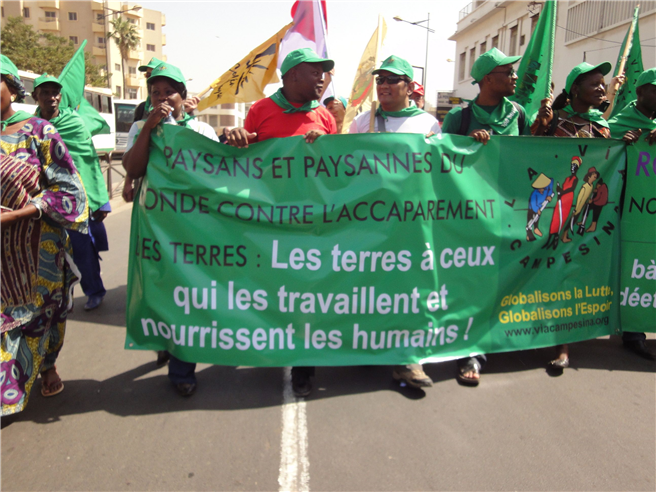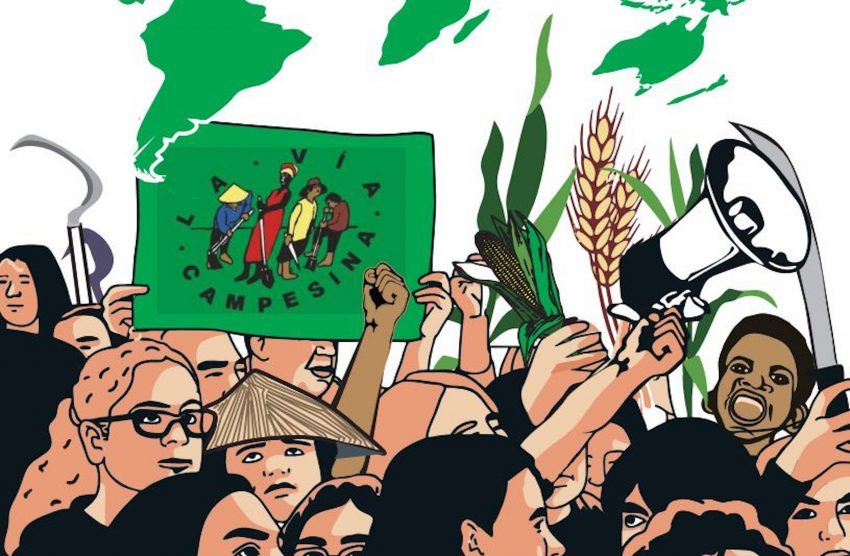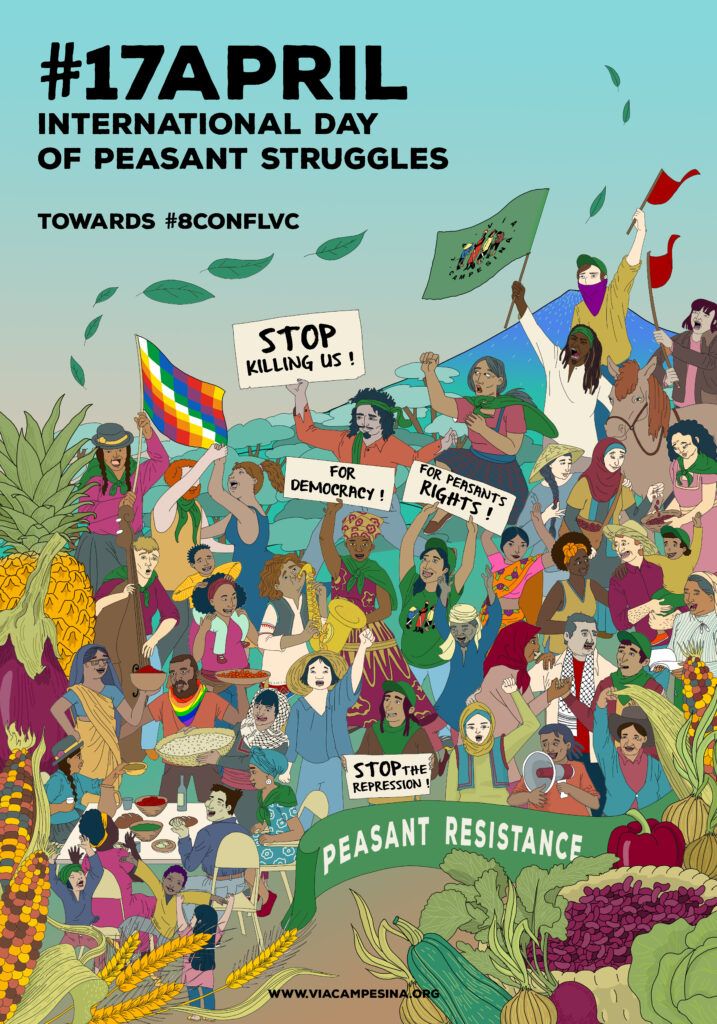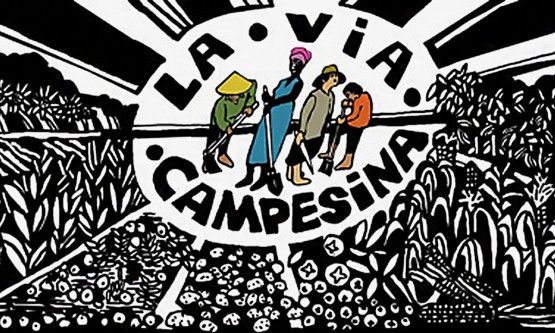Kleinbäuerlicher Widerstand - worum gehts und warum heute?


*** english version below ***
Heute am 17. April ist der Internationale Tag des kleinbäuerlichen Widerstandes. Für unsere Bewegung ein wichtiger Tag, deswegen möchten wir wie (fast) jedes Jahr mit euch teilen, worum es uns und vielen anderen an diesem Tag eigentlich geht.
Kleinbäuerlich - was soll das sein und Widerstand - gegen wen und was denn?
Erstmal kurz zu den Hintergründen.. Der heutige Tag erinnert mahnend an die brutale Ermordung von 19 Aktivist*innen der brasilianischen Landlosenbewegung (Movimento dos Trabalhadores Rurais Sem Terra) durch die brasilianische Polizei am 17. April 1996. Der 17. April ist seitdem ein wichtiger Tag für die kleinbäuerliche Bewegung auf der ganzen Welt, um die andauernden Kämpfe und die zentrale Forderung nach Ernährungssouveränität sichtbar zu machen.
Dabei spielt die weltweite Bewegung und Organisation La Via Campesina eine zentrale Rolle, in der sich seit über 25 Jahren vor allem indigene Kleinbäuer*innen organisieren und für ihre Rechte kämpfen. Es gibt jedoch auch eine europaweite Koordination und die Via Campesina-Organisation in Deutschland ist die AbL (Arbeitsgemeinschaft bäuerliche Landwirtschaft). So viel zu den Strukturen - aber worum gehts?
Die Problematiken sind komplex und die Liste der Themen und Forderungen ist lang, mit der sich die Bewegung auseinandersetzt - sie umfassen jedoch ganz grundlegende Dinge, wie die Verteilung und den Zugang zu Land und Wasser, bäuerliche Rechte und Arbeitsbedingungen oder den Zugang zu unabhängig produziertem Saatgut. Im Zentrum stehen auch die weltweiten Kämpfe von Frauen und queeren Menschen in bäuerlichen Stukturen und die Auswirkungen eines kapitalistischen und industriellen Systems auf ihre Lebensrealitäten. Viele grundlegenden Forderungen werden mit der rasanten Entwicklung einer globalen industriellen Landwirtschaft seit über 100 Jahren immer weiter in Frage gestellt.
Die jeweiligen Lebensrealitäten und ortsspezifischen Themen innerhalb der Bewegung sind sehr unterschiedlich, da sie sich über alle Kontinente verteilen. Im Fokus stehen jedoch seit Beginn die Kämpfe der indigenen Bevölkerungen im globalen Süden, die durch bis heute andauernde koloniale Strukturen in ihrer Unabhängigkeit massiv bedroht sind. Widerstand dagegen gibt es schon lange! La Via Campesina stellt sich weltweit einer industriellen, monopolisierten und entwürdigenden Landwirtschaft entgegen und schafft es seit vielen Jahren eine weltweite Bewegung aufzubauen, die sich auf bäuerliche Unabhängigkeit, Selbstbestimmtheit und Solidarität beruft.
Kleinbäuerlich ist in unserer Gesellschaft leider per se schon ein Begriff von Verlierer*innen - Bäuer*in, wer will das schon sein und dann auch noch klein? Warum klein, wenn es auch groß, hocheffizient und industriell geht? Wir und die Bewegung bezeichnen uns sehr bewusst als Kleinbäuer*innen, weil sich unserer Meinung nach im Kleinen viel mehr abspielt, als im Großen. Weil viele kleine Landwirtschaften, die ihren Fokus auf die Ernährung von Menschen legen anstatt auf Profit, viel stärkere und resilientere Systeme aufbauen können, als ein Großbetrieb. Weil Menschen in einer vielfältigen Landwirtschaft sinnvolle und würdige Arbeitsplätze finden, anstatt von Robotern und Smart Farming Machines ersetzt zu werden. Weil diejenigen, die das industrielle kapitalistische System ganz automatisch unterdrückt, sich in kleinbäuerlichen Strukturen sichere Orte aufbauen können. Weil denen das Land gehören sollte, die darauf Lebensmittel anbauen. Weil natürliche Ressourcen wie Wasser und Saatgut weder in staatliche, noch in private Hände von Großkonzernen gehören.
Klingt alles so logisch und selbstverständlich? Ist es nicht. Für all diese Dinge musste und muss gekämpft und Widerstand geleistet werden.
Manche von uns müssen dies ganz sicher mehr tun als andere.
Der Tag heute soll einerseits auf die Kämpfe von indigenen Bevölkerungen im globalen Süden aufmerksam machen und aus unserer Perspektive hier die enorm beschämende Rolle europäischer Staaten in diesen Kämpfen sichtbar machen. Denn europäische Staaten und auch die USA zerstören durch internationale Handelsabkommen, 'Entwicklungspolitik', die Vereinnahmung lokaler Märkte durch europäische Großkonzerne im Bereich Dünger und Saatgut, den Aufkauf von Land und die ausbeuterische Zerstörung von Ressourcen vor Ort kleinbäuerliche Strukturen weltweit. Die Liste ist endlos und endlos beschämend. Sie zwingt die Kleinbäuer*innen vor Ort dazu, grundlegende Ressourcen wie Land, Wasser und Saatgut immer wieder verteidigen zu müssen anstatt sich vielmehr dem Aufbau von lokalen langfristigen und resilienten Strukturen kümmern zu können. Das ist Kolonialismus 2.0 - das muss ausgesprochen und gesehen werden.
Andererseits ist es eben leider keinesfalls so, dass hier bei uns kleinbäuerlichen Strukturen Wertschätzung, Förderung und gesellschaftliche Relevanz zugesprochen wird. Im Gegenteil - bei den Agrarförderungen ziehen kleine ökologische Betriebe noch immer den Kürzeren, die Bauernverbandslobby ist konservativ, mächtig und großindustriell wie nie zuvor, Verbraucher*innen haben keine Lust auf angemessene Preise oder haben durch unsere Klassengesellschaft keine Chance auf eine selbstbestimmte Ernährung.
Sehr aktuell ist zudem eine Entwicklung in Frankreich, wo mit mehrheitlich staatlichen Geldern riesige Wasserbecken angelegt werden sollen, um der steigenden Wasserproblematik (hallo Klimawandel) in der Landwirtschaft abzuhelfen. Leider senken sie langfristig den Grundwasserspiegel und stehen im Sommer nur den Großbetrieben zur Verfügung - ein typisches Beispiel von Monopolisierung und Privatisierung von natürlichen Ressourcen, mit staatlicher Hilfe. Zudem verhindern sie die Auseinandersetzung der Großbetriebe mit wassersparenden Anbaumethoden. Die Organisationen Les Soulèvements de la Terre und Bassines Non Merci haben Ende März zu einer Demonstration gegen den Bau der Wasserbecken aufgerufen, die zunächst verboten wurde und bei der durch extreme staatliche Repression durch 3200 Polizist*innen 240 Demonstrant*innen verletzt wurden.
Die Vorfälle zeigen uns, dass wir uns auf Staat und Kapital nicht verlassen können und wachsam bleiben müssen. Ganz lokal macht uns in diesem Kontext zum Beispiel unser neuer Giganachbar Tesla immer mehr Sorgen.
Hier könnt ihr euch zu den Entwicklungen in Frankreich weiter informieren und eine Pressemitteilung zu den Ereignissen bei der Demonstration von FIAN und der AbL durchlesen:
https://www.abl-ev.de/fileadmin/Dokumente/AbL_ev/Presse/Mitteilungen_als_pdf/2023-04-04_FIAN_und_AbL_zur_Gewalteskalation_aufgrund_der_Wasserpolitik_in_Frankreich.pdf
https://www.arte.tv/de/videos/114258-000-A/frankreich-streit-um-mega-wasserbecken-geht-weiter/
Und der Link zur La Via Campesina Bewegung: https://viacampesina.org/en/
So viel mal zu den schlechten Nachrichten - die Guten sind: es geht auch anders, es ging schon immer anders, es wird auch anders weitergehen. Nur gehts nicht von alleine.
Und mit den Worten von Via Campesina: Faced with global crises, we build food sovereignty to ensure a future for humanity!

____________________________________________________________
*** english ***
Today, April 17, is the International Day of the Peasants' Movement. This is an important day for our movement, so we would like to share with you, as we do (almost) every year, what it is all about on this day.
Peasants - who is it supposed to be and resistance - against whom and what?
First of all some backgrounds. Today is a reminder of the brutal murder of 19 activists of the Brazilian Landless Movement (Movimento dos Trabalhadores Rurais Sem Terra) by the Brazilian police on April 17, 1996. Since then, April 17 has been an important day for the peasants' movement around the world to make visible the ongoing struggles and the central demand for food sovereignty.
The global movement and organization La Via Campesina plays a central role in this, in which mainly indigenous peasants have been organizing and fighting for their rights for over 25 years. However, there is also a Europe-wide coordination and the Via Campesina organization in Germany is the AbL (Arbeitsgemeinschaft bäuerliche Landwirtschaft). So far for the structures - but what is it about?
The issues are complex and the list of topics and demands the movement deals with is long - but they include very basic things like distribution and access to land and water, farmers' rights and working conditions or access to independently produced seeds. The focus is also on the global struggles of women and queer people in peasant stuctures and the impact of a capitalist and industrial system on their life realities. Many fundamental demands have been increasingly challenged with the rapid development of global industrial agriculture for over 100 years.
The respective life realities and place-specific issues within the movement are very different, as they are spread across all continents. Since the beginning, however, the focus has been on the struggles of the indigenous communities in the global South, whose independence is massively threatened by colonial structures that continue to this day. Resistance against this has existed for a long time! La Via Campesina opposes industrial, monopolized and degrading agriculture worldwide and has been able to build up a worldwide movement for many years, which refers to peasant independence, self-determination and solidarity.
In our society, small-scale farming is unfortunately per se already a term of losers - farmer, who wants to be that and then also small? Why small, when it is also possible to be big, highly efficient and industrial? We and the movement very consciously call ourselves small farmers or peasants, because in our opinion there is much more happening on a small scale than on a large scale. Because many small farms that focus on feeding people rather than making a profit can build much stronger and more resilient systems than huge farms. Because people can find meaningful and dignified jobs in diverse agriculture, instead of being replaced by robots and smart farming machines. Because those whom the industrial capitalist system quite automatically oppresses can build up safe spaces for themselves in small-scale farming structures. Because the land should belong to those who grow food on it. Because natural resources such as water and seeds belong neither in state nor in private hands of large corporations.
Does it all sound so logical and obvious? It isn't. For all these things, there is the ongoing need to fight and resist, for some of us for sure more than others.
On the one hand, today is meant to draw attention to the struggles of indigenous populations in the global south and, from our perspective here, to make visible the enormously shameful role of European states in these struggles. European states and also the USA are destroying smallholder structures worldwide through international trade agreements, 'development policy', the appropriation of local markets by European corporations in terms of of fertilizers and seeds, the purchase of land and the exploitative destruction of local resources. The list is endless and endlessly shameful. It forces local peasants to defend basic resources such as land, water and seeds over and over again instead of having enough time, energy and resources to take care of building local long-term and resilient structures. This is colonialism 2.0 - it has to be said and seen.
On the other hand, it is unfortunately not at all the case that peasant structures are valued and supported here. On the contrary, small organic farms still have disadvantages when it comes to agricultural subsidies, the farmers' association lobby is conservative, powerful and large-scale industrial orientated as never before, consumers have no desire for reasonable prices or have no chance of self-determined nutrition due to our class society.
Very interesting and alarming is also a development in France, where huge water basins are to be built with majority state funds to remedy the increasing water problems (hello climate change) in agriculture. Unfortunately, they lower the water level in the long term and are only available to large farms in summer - a typical example of monopolization and privatization of natural resources, with state help. They also prevent large farms from finally addressing water-saving farming methods. The organizations Les Soulèvements de la Terre and Bassines Non Merci called for a demonstration against the construction of the water basins at the end of March this year, which was initially banned and during which 240 demonstrators were injured by extreme state repression by 3200 cops.
The incidents show us that we cannot rely on the state and capital and must remain vigilant. In this context, our new giant neighbor Tesla, for example, worries us more and more.
Here you can read more about the developments in France and a press release about the events at the demonstration by FIAN and AbL:
https://www.abl-ev.de/fileadmin/Dokumente/AbL_ev/Presse/Mitteilungen_als_pdf/2023-04-04_FIAN_und_AbL_zur_Gewalteskalation_aufgrund_der_Wasserpolitik_in_Frankreich.pdf
https://www.arte.tv/de/videos/114258-000-A/frankreich-streit-um-mega-wasserbecken-geht-weiter/
And a link to the La Via Campesina Movement: https://viacampesina.org/en/
So far for the bad news - the good news is: it can be done differently, it has always been done differently, it will continue to be done differently. Only, it doesn't go differently by itself.
And in the words of Via Campesina: Faced with global crises, we build food sovereignty to ensure a future for humanity!
